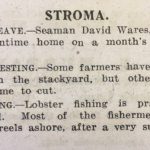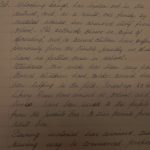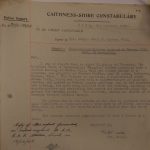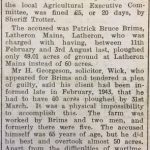Advancing up the Italian peninsula British forces crossed the River Biferno this week and, after driving off a German counter-attack, pushed the German forces back. On 7 October Japanese forces on Wake Island massacred 98 US civilian prisoners of war after an American air raid, for which war crime the commanding officer was executed after the war. Also this week, Allied bombers launched a major air raid on Frankfurt on 4 October and the island of Corsica was liberated by Free French forces.
 On Stroma, as the John O’Groat Journal reported, the harvest was almost all in, and “lobster fishing is practically finished. Most of the fishermen have their creels ashore.” It is interesting to note that it wasn’t only school pupils who got time off at this time of year: “Seaman David Wares, R.N.R., is meantime home on a month’s harvest leave.”
On Stroma, as the John O’Groat Journal reported, the harvest was almost all in, and “lobster fishing is practically finished. Most of the fishermen have their creels ashore.” It is interesting to note that it wasn’t only school pupils who got time off at this time of year: “Seaman David Wares, R.N.R., is meantime home on a month’s harvest leave.”

The teachers of Canisbay School had more things to worry about than the harvest, however. On 8 October the head teacher wrote in the log book, “Whooping cough has broken out in the district, and as a result one family by medical advice has absented itself from school… Attendance this week has been very poor. Several children have colds; several have been helping in the field. Percentage 80.6”
 On 8 October the Wick police reported an accident involving an aircraft and a caravan: “I beg to report that at about 11.10a.m. on Thursday 7th October 1943, a twin-engined “Hampden” bomber aeroplane made a forced landing at Newton Hill, Wick, and caused damage to a caravan, the property of Stewart MacFee, aged 35 years, labourer, Newtown, Wick. The caravan… was parked on Newton common grazings, and as the aircraft was landing, its port wing collided with the caravan, smashing its superstructure and scattering the canvas and woodwork along the ground for several yards.”
On 8 October the Wick police reported an accident involving an aircraft and a caravan: “I beg to report that at about 11.10a.m. on Thursday 7th October 1943, a twin-engined “Hampden” bomber aeroplane made a forced landing at Newton Hill, Wick, and caused damage to a caravan, the property of Stewart MacFee, aged 35 years, labourer, Newtown, Wick. The caravan… was parked on Newton common grazings, and as the aircraft was landing, its port wing collided with the caravan, smashing its superstructure and scattering the canvas and woodwork along the ground for several yards.”
Finally this week, the John O’Groat Journal reported that farmer Patrick Bruce Brims of Latheron Mains had been prosecuted for “having failed to plough the acreage required by the local Agricultural Executive Committee”: he had ploughed 49.01 acres of ground, instead of the 60 acres required of him. In his defence it was argued that he had only been given just over a month to do this; that the farm only had two men working on it whereas before the war there had been five; and that “Brims was faced with a hard, rocky soil.” The sheriff sympathised, but said he had no option but to impose a fine of £5, or 20 days.
prosecuted for “having failed to plough the acreage required by the local Agricultural Executive Committee”: he had ploughed 49.01 acres of ground, instead of the 60 acres required of him. In his defence it was argued that he had only been given just over a month to do this; that the farm only had two men working on it whereas before the war there had been five; and that “Brims was faced with a hard, rocky soil.” The sheriff sympathised, but said he had no option but to impose a fine of £5, or 20 days.
